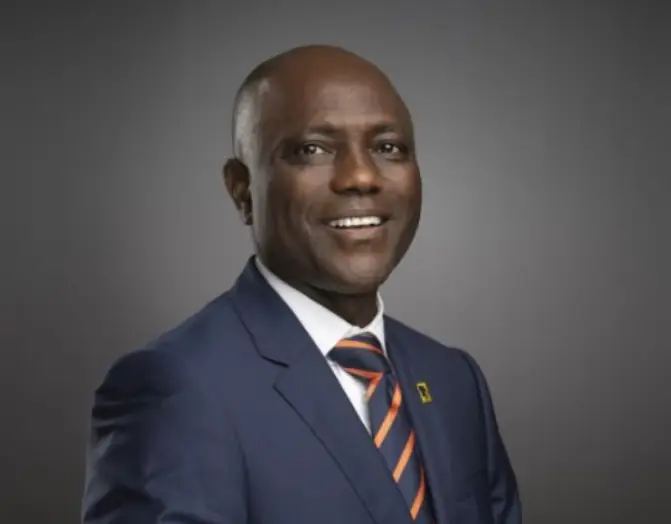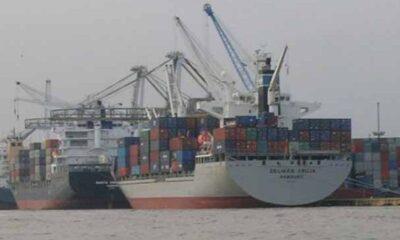Business
Foreign Portfolio Investments Drop 49% In 2 Months Of 2023
Published
1 year agoon
By
Editor
There are indications that foreign investors are not yet comfortable with Nigeria’s external sector position as well as the political environment as Foreign Portfolio Investments, FPIs, declined by a significant 48.7 percent in the first two months of this year when compared to the corresponding period of 2022.
The foreign investors had renewed their divestment measures some months before the general elections, a development which signaled lack of confidence.
Vanguard findings from the latest data released by the Nigerian Exchange Limited, NGX, revealed that the value of FP1s for the two months of the year stood at N44.52 billion as against N86.74 billion in the corresponding period of 2022.
In January 2023, the FPIs declined by 39.7 % to N24.9 billion as against N41.31 billion in the corresponding period of 2022. In February 2023 it dropped by a whopping 56.8 % to N19.62 billion as against N45.43 billion in the corresponding period of 2022.
READ ALSO: Naira Depreciates Against Dollar At Investors’ Window
Economy experts and analysts have attributed the decline on FPIs to foreign exchange volatility, inconsistent government policies, and market regulations among others.
In the absence of the foreign investors, the domestic counterparts have filled the gap and in February 2022 they accounted for 88.41 percent of the total value of transactions recorded in the bourse.
The total value of transactions recorded by the Exchange for the two months period stood at N384.01 billion.
Analysis from the latest figure released by the Exchange showed that foreign investors accounted for only 11.59 percent of the total value of transactions.
A review of the transactions showed that in January 2023 domestic investors outperformed the foreign investors accounting for 87.24 percent or N170.20 billion of the total transaction valued at N195.10 billion.
READ ALSO: Stock Investors Record N13bn Loss In Seven Days Over Interest Rates Hike
In the month of February 2023 the domestic investors also outperformed foreign investors accounting for 89.61 percent of the total value of transactions worth N188.91 billion.
Findings revealed that institutional investors dominated the domestic investments in the two months period representing 79.2 percent of the domestic investments worth N339.49 billion.
Experts’ comment
Many financial analysts believe FPIs commitment in Nigeria is on downward trend because of the exchange rate volatility and the political situation in the country.
Commenting, analyst and Executive Vice Chairman, David Adonri, said: “There is a foreign exchange rate risk attendant to foreign portfolio investment. Persistent depreciation of the Naira in recent past is capable of heightening exchange rate risk leading to loss on investments.
“Secondly, foreign portfolio investors’ confidence was eroded by their inability to remit proceeds of their investments.
READ ALSO: CCB Opens Investigation into Atiku’s SPV Saga, Invites Keyamo
“Finally, FPIs are sensitive to socio-political events. Few of the investors who have taken the risk arising for the political tension are investing in Fixed Income, FI.
“The political tension in Nigeria even with the conclusion of the general election is still not over and it continued to threaten the safety of their investments, hence their low confidence in the economy.
“If the new administration is able to make the market attractive we would begin to see foreign investors back to the market.”
Tajudeen Olayinka, CEO of Wyoming Capital and Partners, said: “The Foreign Portfolio Investment in equity is declining because of the exchange rate management.
“A situation of multiple exchange rate regime cannot give room for proper allocation of resources in the economy. This is one of the macroeconomic factors that have made it difficult for Nigeria’s economy to adjust to full employment output and external balance over the years.
READ ALSO: 100,000 May Stall Investigation Of Murdered Enugu House Help– Group
“This situation may improve in the coming years with an administration that has preference for private sector dominance.”
Also commenting, Prof. Uche Uwaleke, Economy expert and President Association of Capital Market Academic of Nigeria, said: “Until we begin to see changes in the monetary policies such as exchange rate, improved market regulations the FPIs will continue to fall.”
Reacting to the decline in FPI, analyst/ Head of Research and Investment, Fidelity Securities Limited, Victor Chiazor, said: “We have constantly seen reduction in foreign portfolio investments year-on-year, YoY, and it is likely that the situation may change once the new administration get things right in the Nigerian economic management system.”
He added, “Issues around exchange rate, capital importation and corporate governance amongst others continue to discourage foreign inflow.
“Until foreign investors see concrete policies and effort to correct some of these anomalies, domestic investors will continue to carry the market.
“Moreso, over the years we have seen investors confidence reduce which has led to the drop in Foreign Portfolio Investment.
“Issues around unavailability of foreign exchange, corporate governance, weak market regulation and oversight function and inconsistent government policies have weakened foreign participation in the equities market and until all of these issues are addressed the market will continue to be dominated by domestic participants.”
VANGUARD
You may like


Snake Island To Attract $1bn Private Investment – Official


Manufacturers In Dire Straits As Unsold Goods Hit N470bn


White Dove’s Pioneering Efforts in Alternative Crude Evacuation, A Differentiating Factor – CEO


2023: Ovia Youths Begins Mobilisation For Igbinedion


Congress rolls out ‘Better Deal,’ new economic agenda


MSNBC finishes first in primetime basic cable for first time ever

The Central Bank of Nigeria (CBN) started fresh and direct sales of US dollars at N1,021 per dollar to Bureau De Change operators.
Nigeria’s apex bank disclosed this in a circular signed by its Director of Trade and Exchange Department Hassan Mahmud.
“We write to inform you of the sale of $10,000 by the Central Bank of Nigeria (CBN) to BDCs at the rate of N1,021/$1. The BDCs are in turn to sell to eligible end users at a spread of NOT MORE THAN 1.5 percent above the purchase price,” the circular posted on its website read.
READ ALSO: Tinubu Unveils African Counter-Terrorism Summit
“ALL eligible BDCs are therefore directed to commence payment of the Naira deposit to the underlisted CBN Naira Deposit Account Numbers from today, Monday, April 22, 2024, and submit confirmation of payment, with other necessary documentations, for disbursement of FX at the respective CBN Branches.”
CBN’s move is coming as the naira is recording a slight depreciation against the dollar after weeks of gains.
In late March, the bank also sold $10,000 to each of the eligible Bureau De Change (BDC) operators in the country at the rate of N1,251/$1.
READ ALSO: Mixed Reactions Trail Video Of Couple’s Customised N200 Notes
Like in the most recent sales, it warned BDCs against breaching terms of the dollar sales, vowing to sanction defaulters “including outright suspension from further participation in the sale”.
The fortunes of the naira have fallen sharply since President Bola Tinubu took over in May. Inflation figures have reached new highs and the cost of living hitting the rooftops.
Nigeria’s currency slid to about N1,900/$ some months ago at the parallel market. But in recent weeks, it has gained against the dollar.
The Nigerian authorities have also doubled down on their crackdown against cryptocurrency platform Binance and illegal BDCs.
On March 1, the CBN revoked the licences of 4,173 BDCs over compliance failures.

Olusegun Alebiosu has been appointed as the Acting Managing Director/Chief Executive Officer of First Bank of Nigeria Limited (FirstBank Group), effective April 2024.
Alebiosu steps into this pivotal role from his previous position as the Executive Director, Chief Risk Officer, and Executive Compliance Officer, a position he held since January 2022.
Alebiosu brings to the helm of FirstBank over 28 years of extensive experience in the banking and financial services industry. His expertise spans various domains including credit risk management, financial planning and control, corporate and commercial banking, agriculture financing, oil and gas, transportation, and project financing.
READ ALSO: JUST IN: Access Holdings Names New Acting CEO
Having embarked on his professional journey in 1991 with Oceanic Bank Plc. (now EcoBank Plc.), Alebiosu has held several notable positions in esteemed financial institutions.
Prior to joining FirstBank in 2016, he served as Chief Risk Officer at Coronation Merchant Bank Limited, Chief Credit Risk Officer at the African Development Bank Group, and Group Head of Credit Policy & Deputy Chief Credit Risk Officer at United Bank for Africa Plc.
Alebiosu’s academic credentials further enrich his professional profile. He is an alumnus of the Harvard School of Government and holds a Bachelor’s degree in Industrial Relations and Personnel Management. Additionally, he obtained a Master’s degree in International Law and Diplomacy from the University of Lagos, as well as a Master’s degree in Development Studies from the London School of Economics and Political Science.
READ ALSO: Meet Newly Appointed Union Bank CEO
A distinguished member of various professional bodies, including the Institute of Chartered Accountants (FCA), Nigeria Institute of Management (ANIM), and Chartered Institute of Bankers of Nigeria (CIBN), Alebiosu is renowned for his commitment to excellence and ethical practices in the banking sector.
Beyond his professional endeavors, Alebiosu is known for his passion for golf and adventure. He is happily married and a proud parent.
With Alebiosu’s appointment, FirstBank of Nigeria Limited anticipates continued growth and innovation under his leadership, reinforcing its position as a leading financial institution in Nigeria and beyond.
Business
CBN Gives New Directive On Lending In Real Estate
Published
1 week agoon
April 17, 2024By
Editor
The Central Bank of Nigeria, CBN, has released a new regulatory directive to enhance lending to the real sector of the Nigerian economy.
The directive, issued on April 17, 2024, with reference number BSD/DIR/PUB/LAB/017/005 and signed by the Acting Director of Banking Supervision, Adetona Adedeji, signifies a notable shift in the bank’s policy towards a more contractionary approach.
In line with the new measures, the CBN has reduced the loan-to-deposit ratio by 15 percentage points, down to 50 per cent.
This move aligns with the CBN’s current monetary tightening policies and reflects the increase in the Cash Reserve ratio rate for banks.
READ ALSO: JUST IN: CBN Gov Sacks Eight Directors, 32 Others
The LDR is a metric used to evaluate a bank’s liquidity by comparing its total loans to its total deposits over the same period, expressed as a percentage.
An excessively high ratio may indicate insufficient liquidity to meet unexpected fund requirements.
All Deposit Money Banks are now mandated to adhere to this revised LDR.
The CBN has stated that average daily figures will be utilised to gauge compliance with this directive.
Furthermore, while DMBs are encouraged to maintain robust risk management practices in their lending activities, the CBN has committed to continuous monitoring of adherence and will adjust the LDR as necessary based on market developments.
READ ALSO: JUST IN: CBN Increases Interest Rate To 24.75%
Adedeji has called on all banks to acknowledge these modifications and adjust their operations accordingly. He emphasised that this regulatory adjustment is anticipated to significantly influence the banking sector and the wider Nigerian economy.
The circular read in part, “Following a shift in the Bank’s policy stance towards a more contractionary approach, it is crucial to revise the loan-to-deposit ratio policy to conform with the CBN’s ongoing monetary tightening.
“Consequently, the CBN has decided to decrease the LDR by 15 percentage points to 50 per cent, proportionate to the rise in the CRR rate for banks.
“All DMBs must maintain this level, and it is advised that average daily figures will still be applied for compliance assessment.
“While DMBs are urged to sustain strong risk management practices concerning their lending operations, the CBN will persist in monitoring compliance, reviewing market developments, and making necessary adjustments to the LDR. Please be guided accordingly.”

PHOTOS: FCCPC Raids Supermarkets In Port Harcourt, Seizes Underweight, Re-bagged Rice

Outrage As Kingsmen Flogged Anambra Man To Death [VIDEO]

Man Declared Wanted For Stabbing Wife To Death, Attempted Murder of Two Children
Trending

 Entertainment3 days ago
Entertainment3 days agoBridesmaids’ Dance At Wedding Causes Stir On Social Media [VIDEO/PHOTOS]

 Politics5 days ago
Politics5 days agoEdo Guber: Akoko-Edo PDP Leaders Meet In Igara, Describe Ighodalo, Ogie As ‘Perfect Match’

 Metro3 days ago
Metro3 days agoVIDEO: ‘UNN Lecturer’ Caught Pants Down With Married Student

 News1 day ago
News1 day agoDrama! Supporters Of Yahaya Bello Perform Rituals to Prevent His Arrest By EFCC [Video]

 News2 days ago
News2 days agoVIDEO: Force PRO Orders Arrest Officers Caught On Video Bashing Driver’s Car

 Headline2 days ago
Headline2 days agoDrama As Women Fight Dirty, Breasts Fall Out During Spring Break Outing In US [PHOTOS/VIDEO]

 News4 days ago
News4 days agoOutrage As Chinese Supermarket In Abuja Denies Nigerians Entry

 Entertainment2 days ago
Entertainment2 days agoNollywood Actor, Zulu Adigwe Is Dead

 News3 days ago
News3 days agoIGP, Jonathan Disagree Over State Police

 Metro2 days ago
Metro2 days agoEdo Cultists Kill Rival In Daughter’s Presence, Abandon Getaway Car
































